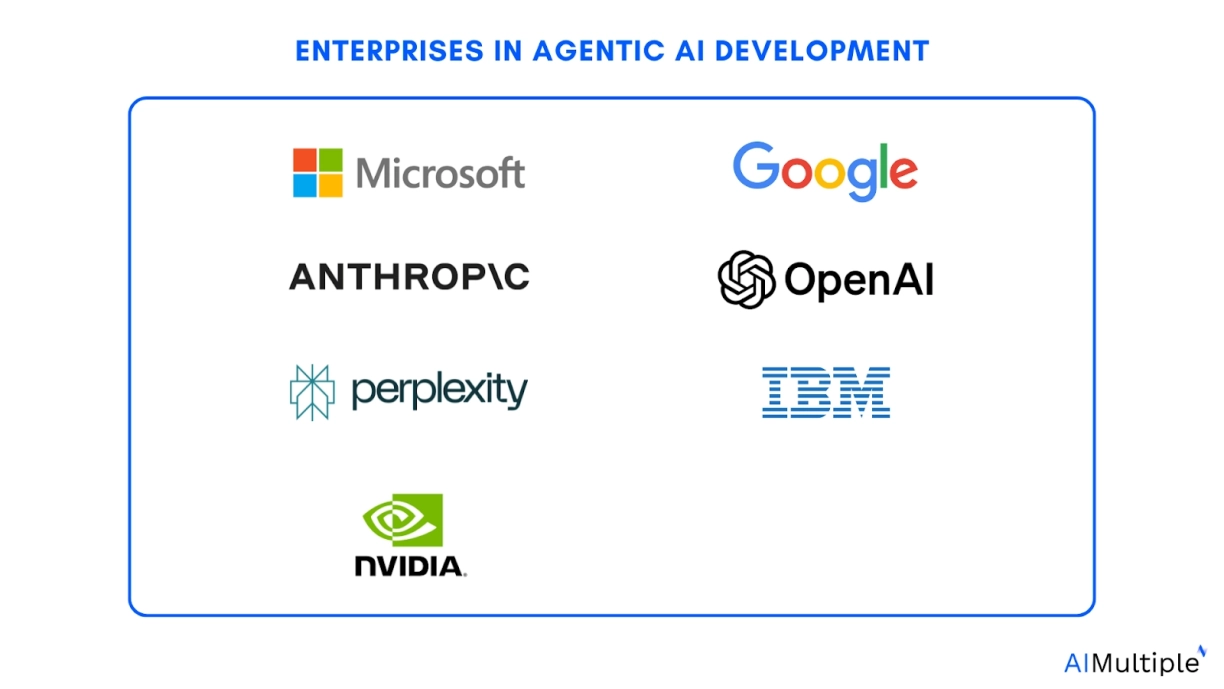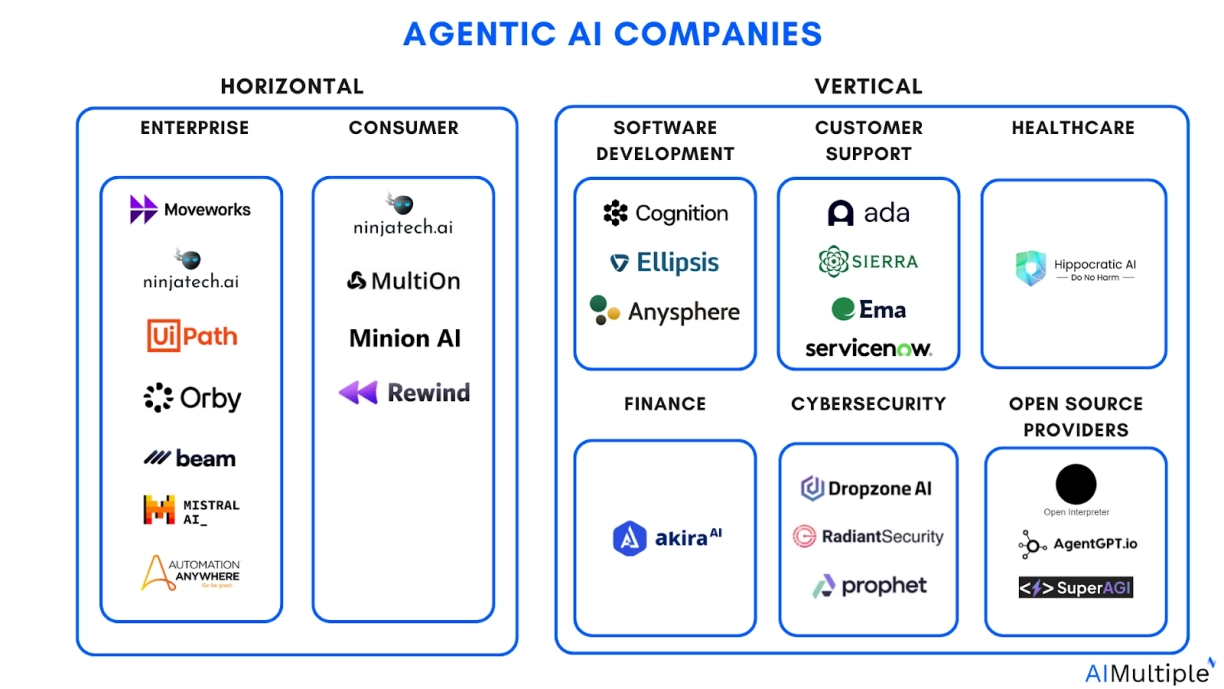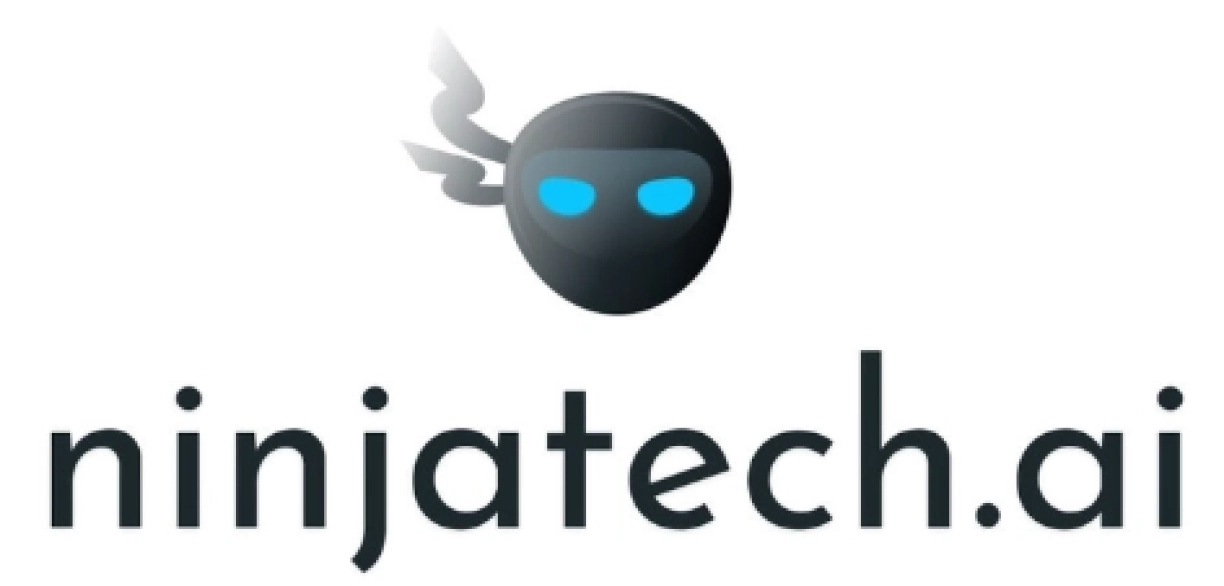
Though AI agents are being hyped and some companies rebrand their chatbots as agentic tools, there are still few agents in production.
Previously we benchmarked some of these capable AI agents over several real-world tasks:
In this article, we identified key agentic AI companies that live up to the hype, we listed:
Enterprises in agentic AI development
These companies primarily focus on agentic AI research and development, offering initiatives like ethical AI guidelines and environments for agent-based development.
Some of them, including Anthropic, Perplexity AI, Google, OpenAI, and IBM, also provide tools for developing agentic AI.

Microsoft Corporation
Microsoft Corporation primarily focuses on providing AI models through its cloud platform. Offers Microsoft Azure AI, a cloud-based AI agent builder service for developers. It enables to build and deploy AI agents.
Additionally, Microsoft’s AI development tools such as Visual Studio help developers build and deploy agentic AI solutions.
Anthropic
Offers Claude AI models with agentic capabilities to control computers directly from web browsing to coding and app interaction.
Anthropic also focuses on constitutional AI, a key approach where AI systems are guided by a “constitution”. This ensures that the AI system’s actions are autonomously reasoned while staying aligned with human values and ethical guidelines.
Perplexity AI
Delivers Comet AI browser an agentic task automation for web browsing. Comet completes tasks on behalf of the user like searching for flight options.
NVIDIA Corporation
NVIDIA aids agentic AI companies by providing GPUs, and software frameworks. These tools enable the development, testing, and deployment of AI agents across industries like autonomous vehicles, robotics, gaming, and AI research.
Examples of NVIDIA’s hardware and software infrastructure:
- GPU technology: NVIDIA’s GPUs, like the A100 Tensor Core, accelerate the training of AI models, enabling rapid processing of large datasets for autonomous decision-making.
- CUDA platform: CUDA allows developers to leverage NVIDIA GPUs for computing, crucial for creating AI systems with agent-like capabilities.
- Autonomous Systems: NVIDIA’s GPUs and platforms like NVIDIA Drive power autonomous systems, including self-driving vehicles and robotics, where agentic AI makes real-time decisions without human input.
- Omniverse: The Omniverse platform enables the creation of simulations, providing realistic environments to train agentic AI systems in controlled settings.
Google develops agentic AI systems that can reason and make autonomous decisions. For example, Google and Stanford researchers developed the Stanford AI Village in 2023, a sandbox setting populated with AI.
In addition to its research initiatives, Google also focuses on developing AI agents. In early 2025 the company released its agentic AI coding tool: Claude Code.
Google also has started to experiment with its AI agents called Project Mariner, an agentic tool that can take control of your browser and use a Chrome extension to complete tasks, though it’s still in its early stages.
OpenAI
Delivers OpenOperator an AI agent that can browse the web and perform tasks for the user. The company has set itself apart from its competitors by prioritizing research to improve agentic AI.
Here are some key examples of OpenAI’s AI research:
- Reinforcement Learning from Human Feedback (RLHF): Uses human feedback to teach AI decision-making, improving adaptability and goal alignment.
- Proximal Policy Optimization (PPO) for agentic behavior: Uses an algorithm for training reinforcement learning agents that need to reason about their actions and outcomes. This helps develop AI systems that can make complex decisions.
- Autonomous decision-making: Builds autonomous agents that can perform tasks with minimal human guidance emphasizing reasoning capabilities. For example, their language models like GPT-4, while not traditionally agentic on their own, are key components in developing intelligent agents that reason about problems.
IBM
Delivers IBM Watsonx, an AI agent with agentic capabilities. It can be used for enterprise-wide business operations, including HR, procurement, sales, and customer service.
Companies with agentic AI applications
Most of these early-stage agentic AI companies use LLMs to automate business operations for particular industries. Some (e.g. MultiOn) focus on automating consumer tasks such as booking meetings or interacting with websites.

What do agentic AI companies actually do?
At their core, these companies are building autonomous or semi-autonomous systems—called “agents”—designed to handle complex tasks with minimal human input.
These agents can reason, plan, take action, and adapt based on feedback. Instead of just answering questions or completing a single command, they aim to get things done.
Why vendors are focusing on agentic AI
Language model providers are evolving their offerings beyond just providing models, focusing more on improving user experience and integrating fully autonomous capabilities. One such example is ChatGPT Operator, which can perform multi-step research on the internet.
Agentic AI enhances business processes in several ways:
- Reasoning & problem-solving: Agentic AI offers reasoning as a core feature, breaking complex problems into manageable components. This allows the model to reason each part systematically, simulating human-like thought processes to provide accurate responses.
- Improving productivity with task decomposition: Break down complex tasks into simpler, more manageable sub-tasks, enhances traceability and accessibility by making each step of the process easier to follow and interact with.
- Enhancing knowledge work: Knowledge workers spend significant time searching for information and synthesizing data. Agentic AI automates this process.
- Providing real-time information synthesis: Agentic AI can synthesize information from multiple sources on the Internet in real time, allowing it to handle complex queries and provide actionable insights quickly, something that would take humans hours to do.
Agentic AI companies for business process automation
These agentic AI companies provide AI agents for enterprise workflows at scale. These companies focus on building AI agents that:
- Automate routine business workflows: Handle tasks like IT support, HR management, and customer service.
- Integrate with cross-systems and knowledgebases: Sync data and processes across various business systems (e.g., ERP, CRM).
- Adapt business process: Adapt to new scenarios or challenges without requiring major reprogramming.
Moveworks

Valuation: $2.1 billion (as of 2021)
Functionality: Focuses on enhancing workflows, especially in IT support and HR, through enterprise-grade cross-system operation.
NinjaTech AI

Valuation: $4.73 billion (as of 2024)
Functionality: Specialized agents for tasks like coding, advising, and image generation, with the platform allowing users to compare and access results from multiple AI models.
Core technology: Offers an AI assistant platform with agentic capabilities, utilizing over 20 external AI models including those from OpenAI and Google, with a proprietary coding model based on Llama 3.1 405B.
Implements AWS AI chips and offers a subscription-based model for AI tools.
UiPath

Valuation: $35 billion (as of 2024)
Functionality: AI-powered decision-making capabilities enhance RPA with real-time analytics and insights, improving business workflows across various functions.
Orby AI

Valuation: $129 million (as of 2024)
Functionality: Develops AI agents for customer service automation for customer support with self-service tools and intelligent assistants. Uses natural language processing (NLP) to enhance customer interactions.
Beam AI

Valuation: $500 million to $1 billion(post-money valuation as of 2021)
Functionality: Focuses on Agentic Process Automation, providing a platform for managing AI agents across business processes with pre-trained templates and customizable solutions. Offers tools for businesses to create, test, and deploy AI agents, with a focus on operational efficiency.
Develops industry-specific solutions for sectors like insurance and healthcare, expanding tools and integrations.
Mistral AI

Valuation: €6 billion (over $6 billion)
Functionality: LLMs power applications in customer service automation, content creation, and enterprise AI solutions.
Core technology: Develops large language models (LLMs), including open-weight models like Mixtral 8x7B and Mixtral 8x22B, and enterprise-grade models like “Mistral Large”.
Partnerships:
- Microsoft: Provides Mistral AI access to Azure’s AI infrastructure for developing and deploying LLMs.
- SAP: Integrates Mistral AI’s models into SAP’s Business Technology Platform, enhancing AI-enabled solutions.
Automation Anywhere

Valuation: $7.3 billion (as of 2022)
Functionality: Focuses on intelligent automation by integrating RPA with AI, streamlining business processes in finance, IT, HR, and other domains.
Has partnerships with Google Cloud, Microsoft, and Amazon to integrate AI with RPA solutions across enterprises.
Agentic AI companies for consumers
These companies are building AI agents that can handle daily activities, such as meeting scheduling or email management.
MultiOn

Valuation: $100 million (as of 2024)
Functionality: Focuses on AI-powered collaboration tools for businesses, integrating chatbots and automation within platforms for team communications and workflow management.
Partnerships: Works with business collaboration platforms like Slack and Microsoft Teams to enhance automation and efficiency.
Minion AI

Valuation: $2.92 million (as of 2023)
Functionality: Develops AI-powered virtual assistants for specific business processes, leveraging speech recognition and machine learning to assist in task automation.
Specializes in automating business processes related to customer interactions, employee scheduling, and data analysis.
Rewind AI

Valuation: $75 million (as of 2022)
Functionality: It assists engineers in recovering lost code, reproducing bugs, managing complex setups, and tracking terminal histories. For executives, it provides automated meeting summaries to enhance efficiency.
Agentic AI companies for software development
Cognition Labs

Funding: $5 billion (as of 2025)
Functionality: Develops Devin is an agentic AI that functions as a fully autonomous software engineer. Devin achieved top performance on the SWE-bench coding benchmark, resolving 13.86% of issues end-to-end without any human intervention.
Ellipsis

Valuation: Valuation is not publicly disclosed.
Functionality: Specializes in automating business processes like data entry, invoice processing, and document categorization to streamline back-office operations.
Provides tools like Ellipsis Extractor for data processing and Ellipsis Workflow Automation for seamless business automation.
Anysphere Inc

Valuation: $2.5 billion (as of 2025)
Functionality: Focuses on AI-driven analytics for businesses looking to optimize their supply chain management, predictive maintenance, and business intelligence processes.Offers products like Anysphere Analytics Platform for business insights and Anysphere AI Engine for predictive decision-making.
Agentic AI companies for customer support
Ada

Valuation: $1.2 billion (as of 2021)
Functionality: Specializes in AI-driven conversational automation with a focus on customer service chatbots that offer self-service for customer interactions.
Works with Salesforce, Zendesk, and Shopify to provide integrated solutions for seamless customer service experiences.
Sierra

Valuation: $4.5 billion (as of 2024)
Functionality: Focuses on AI-powered sales assistant solutions. Integrates with major CRM platforms such as Salesforce and HubSpot for seamless operations.
Ema

Valuation: Valuation is not publicly disclosed.
Functionality: Provides personalized customer support by automating tasks like query handling and service requests, focusing on sectors like e-commerce and telecommunications.
Collaborates with CRM platforms like Salesforce for easy deployment within customer service workflows.
ServiceNow

Valuation: $218 billion (as of 2024)
Functionality: Provides cloud-based enterprise solutions. Focuses on workflow automation, enabling businesses to streamline their operations in areas like IT service management, customer service management, and HR management.
Agentic AI companies for healthcare
Hippocratic AI

Valuation: $1.64 billion (as of 2024)
Focuses on automating low-risk, non-diagnostic tasks in healthcare, particularly in chronic care management, wellness coaching, and follow-up care.
Agentic AI companies for cybersecurity
Dropzone AI

Valuation: Valuation is not publicly disclosed.
Focuses on AI-driven threat detection and response in cybersecurity, using agentic AI systems to monitor, analyze, and respond to potential security threats in real time.
Prophet

Valuation: Valuation is not publicly disclosed.
A cybersecurity AI platform that uses predictive analytics and agentic AI to foresee security risks and proactively mitigate threats across enterprise networks.
RadiantSecurity

Valuation: Valuation is not publicly disclosed.
Specializes in AI-enhanced security operations, integrating agentic AI to automate threat detection, risk assessment, and incident response for organizations.
Open source agentic AI companies
Open Interpreter

Valuation: Valuation is not publicly disclosed.
Offers open-source tools for interpreting AI models and developing automated agents that can understand and process natural language commands.
AgentGPT

Valuation: Valuation is not publicly disclosed.
Aimed at open-source general-purpose agents, AgentGPT allows developers to build and deploy AI agents that can perform a variety of tasks, from customer service to complex problem-solving.
SuperAGI

Valuation: $100 million (as of 2024)
SuperAGI is an open-source platform for developing agentic AI solutions, offering tools to build, train, and deploy AI agents capable of handling complex workflows and tasks.
Agentic AI vs. generative AI
Agentic AI delivers autonomous capabilities by using a digital ecosystem that integrates large language models (LLMs) to perform tasks independently on a user’s or another system’s behalf. While ChatGPT, a popular generative AI model, shares some creative functions with agentic AI, it is not the same.
- Generative AI is designed for content creation. It generates new text, images, videos, and code based on human input and prompts. However, it still relies on human guidance to shape the context and direction of its outputs.
- Agentic AI focuses on action. It’s built to understand complex situations, make autonomous decisions, and take action to solve problems or achieve objectives.
In simple terms, Gen AI is about “creating” content, while Agentic AI is about “doing” tasks, solving problems, and executing strategies.
Further reading
External Links
#Top #Agentic #Companies




